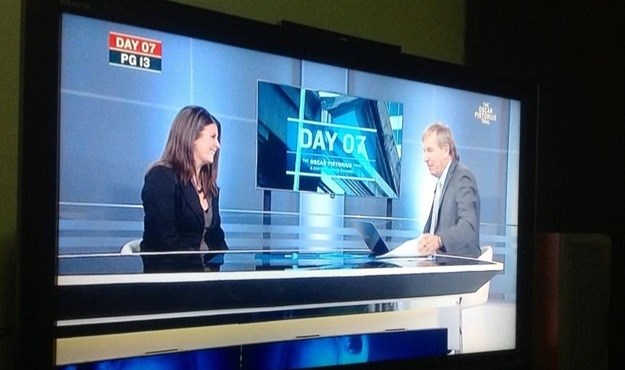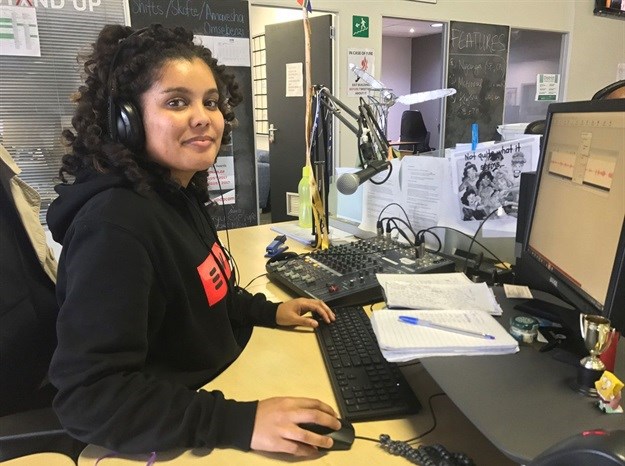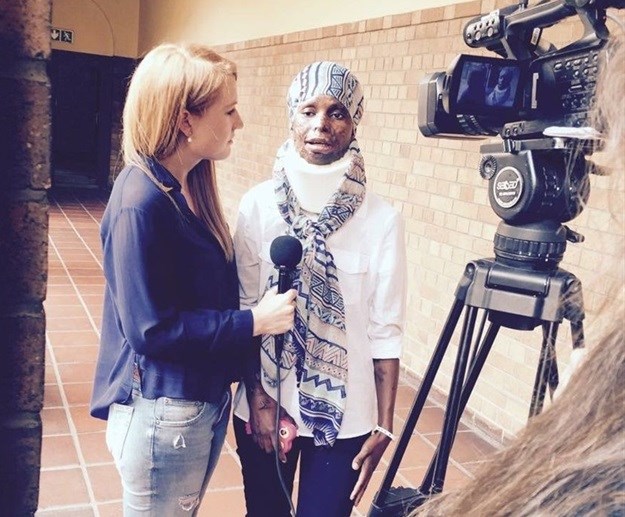
With the tagline ‘Inside the truth’, Primedia Broadcasting’s award-winning Eye Witness News or EWN team is clearly fierce and fearless. It’s also female-led, with Katy Katopodis as editor in chief, Lebo Moeketsi as Johannesburg news editor and Charlotte Kilbane as Cape Town news editor, Cindy Poluta as sports editor and Camilla Bath on digital development. Most of their news anchors and heavyweight senior journalists also women, with the familiar names as Mandy Wiener, Monique Mortlock, Gia Nicolaides, Mia Lindeque and Thando Khubeka often ringing in our ears as they cover all the grit and gore and all have stories of their own to tell.
I caught up with just three members of the team, all EWN senior journalists – Nicolaides, who is also author of Reporting from the Frontline; Monique Mortlock, also a voice over artist and MC; and Mia Lindeque, also a magazine columnist – for their career highlights, the aspects of media work that need a shake-up, particularly where diversity is concerned and their scariest work experience to date. Brew your favourite hot drink and get immersed in these born storytellers’ tales…
Mortlock: In my first year of working at EWN in 2015, I won the SAB Environmental Media Award in the video category for a feature I did with multimedia journalist Aletta Harrison on Cape Town’s sewage outfalls. Fast-forward to 2016, where I won another SAB Environmental Media Award, this time in the audio category for a feature I did on the drought in the Western Cape. These are two moments I cherish because they were unexpected as I’m so new to the business yet my work is getting recognised on a national level. I’m proud of how much I’ve accomplished in the short space of time I’ve been in the business, but I’m most proud when young people in my community approach me for advice and guidance because they see what I’m doing. I come from a disadvantaged community where I see many girls and women not living up to their full potential, usually due to their circumstances. I also see this in the different schools where I do outreaches, so when I get a chance to impact at least one of these lives, this is what I’m most proud of being able to do. Share a brief overview of your career highlights and what you’re most proud of as a female media worker.
Share a brief overview of your career highlights and what you’re most proud of as a female media worker.
Nicolaides: I've been fortunate enough to cover some of the most compelling stories in South Africa in the past decade. This includes Madiba's funeral, the Marikana shooting, the Oscar Pistorius trial, the constitutional court case on Nkandla and many others. As a female journalist I'm most proud of being able to persevere on some of these stories even when women were not welcome in certain areas or when the situation was dangerous. It's important that I am still able to deliver the highest quality of journalism even under these challenging circumstances. Mortlock in action at her desk.
Mortlock in action at her desk.
Lindeque: In 2014, Ines Antonio was attacked with drain acid. Her boyfriend who ended up being convicted of the crime, was on the run. Before pouring acid over her, her boyfriend said: "If I can't have you, no one will." I’ve covered many stories dealing with the abuse of women by their partners, but this one was different. I remember seeing pictures of her burns while in hospital. It was so graphic that we couldn't publish it. Her face, back, hands and even her breasts were burned. Jan Pieterse was finally arrested with the help of journalists like us at EWN, who persisted to cover the story and to help her get justice. Antonio and I still keep in touch from time to time. Her story is an inspiring one, one of a man who tried to destroy her identity, confidence and her womanhood. But she stood firm and regained her power.

Other highlights in my career include an investigation I conducted in 2015 after receiving a chilling account of a woman who was ill-treated by nurses during the birth of her child at the Rahima Moosa Mother and Child Hospital. The woman subsequently lost the baby. After publication of the story, more and more women came forward with similar stories. Three nurses were subsequently suspended. To be able to help the mothers who lost their babies get some sort of closure, gave me a lot of satisfaction. I helped them on their journey to get answers and justice.
I’m also proud to have been able to cover a number of housing protests recently in Ennerdale and Eldorado Park. Even though the protests were often violent and I sometimes felt unsafe I persisted, trying to understand the frustration felt by members of the community. I was teargassed and threatened many times. I later returned to the area, determined to confront people who sold land illegally and uncover the reasons why people steal land from their rightful owners. Through this story, I gave a voice to a group of people who felt forgotten by their government and disempowered.
 On the converse, share a few of the aspects of media work that need a shake-up, particularly where diversity is concerned.
On the converse, share a few of the aspects of media work that need a shake-up, particularly where diversity is concerned.
Nicolaides: Luckily, the media industry is more diverse compared to many others. If one takes a cross-section of the entire media industry, you would find it’s well represented in terms of race, gender, and sexual orientation. My editor and many others are women. They have paved the way in breaking the mould of gender stereotypes in the media workspace and it's up to us to continue to make sure there are many talented women to take over. Unfortunately, certain ‘beats’ or stories like IT and business tend to still be assigned to male reporters.
Mortlock: I believe equal pay is still a big issue, even when there is kick-ass female leadership. More black female leadership is still crucial in the media world, whether as editors or CEOs, as I believe this will provide the diverse perspective needed to shape the way our stories are written and pushed into the public space.
 Let us in on your scariest work experience.
Let us in on your scariest work experience.
Nicolaides: Covering the shooting in Marikana remains the most terrifying and challenging experience in my career. Not only were female journalists threatened with rape and death while reporting on the violent protest in 2012 but I also witnessed the shooting of 34 miners. At the time, I was hiding behind a police van as live ammunition was being used against the protesters. My microphone was in my hand and my recorder was switched on, so while I was able to capture those moments, it still seems surreal.
Mortlock: The scariest moment had to be last year, when I followed up on a shooting in Mitchells Plain. A group of guys, presumably gang members, clearly didn’t want me speaking to residents and shouted at me to leave. I ignored them as I was concluding an interview with an elderly man. When I eventually walked to my car I noticed the group had edged closer to where it was parked. Some of the young men started swearing at me loudly, rushing me to leave. I hurried to my car, while still trying to appear calm, and as soon as I was in the driver’s seat a huge rock came flying past the window. I looked in the rear-view mirror and saw them walking towards me, hurling more rocks at the car. Thankfully nothing happened to me, but it remains my top scariest moment. No other story, no matter how frightening the circumstances, has freaked me out more.
Lindeque: There have been many. Last week, a colleague and I covered a story in the Johannesburg CBD dealing with hijacked buildings. We interviewed homeless people, including a nyaope addict. The group demanded money, even though we had no cash on us. One man wanted to search me, and I only found out later that he called his friends to help him take our equipment. We managed to run to safety, taking shelter in a nearby shop.
Despite facing all this and more on a daily basis, they keep at it. That’s what I call bravery and dedication at its best. Follow EWN itself as well as Nicolaides, Mortlock and Lindeque on Twitter.
